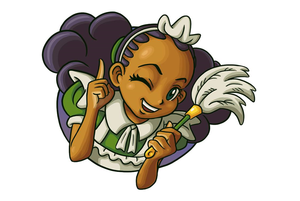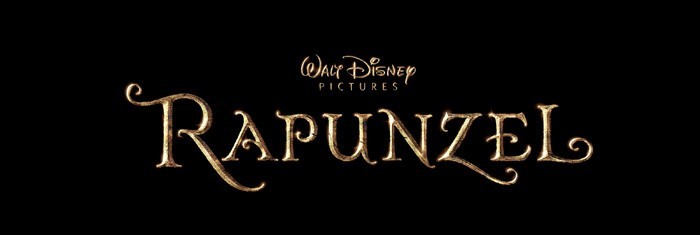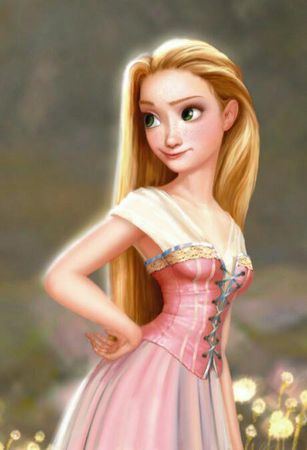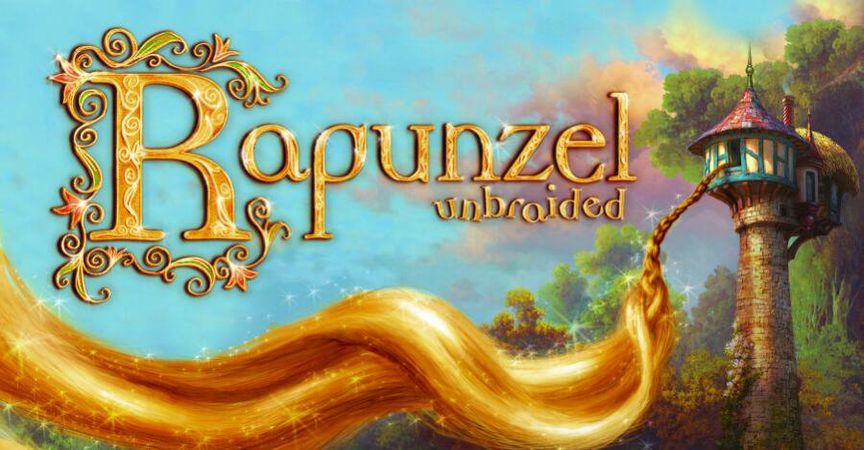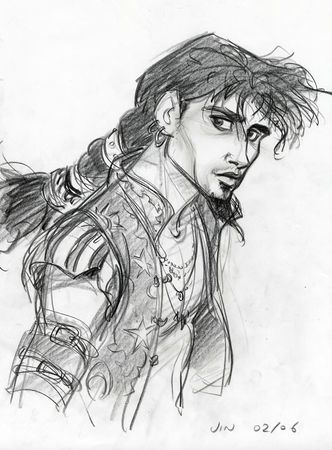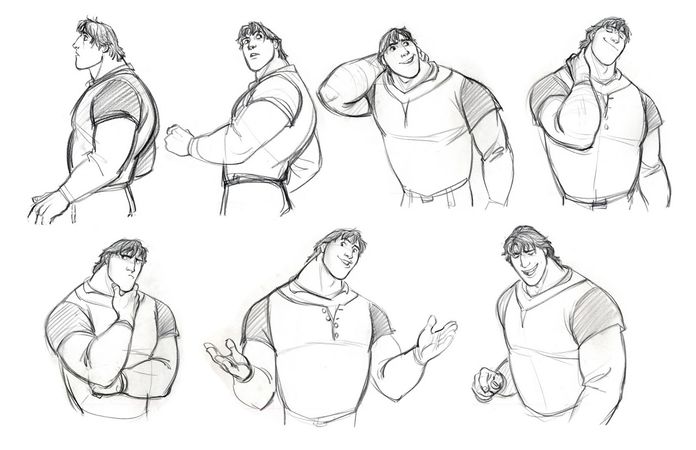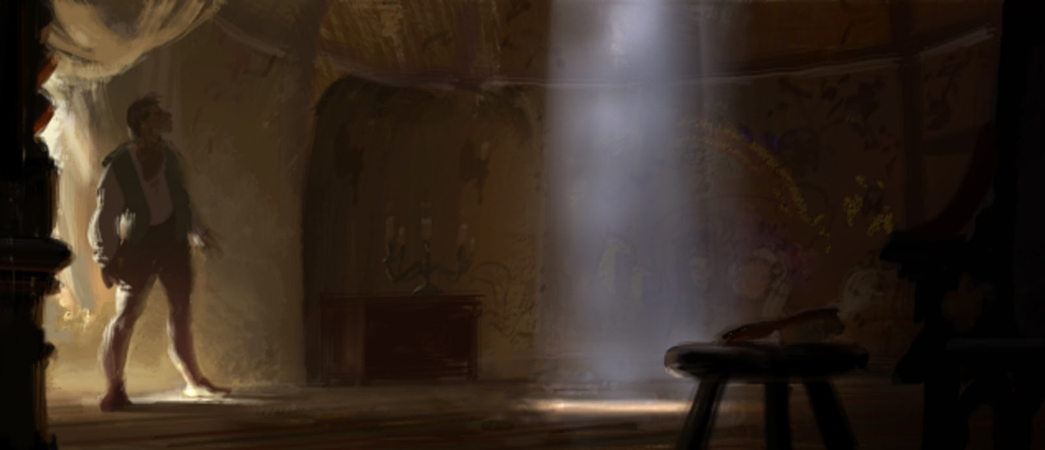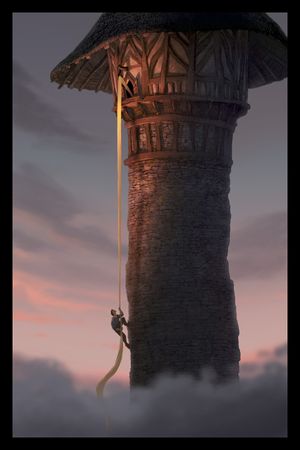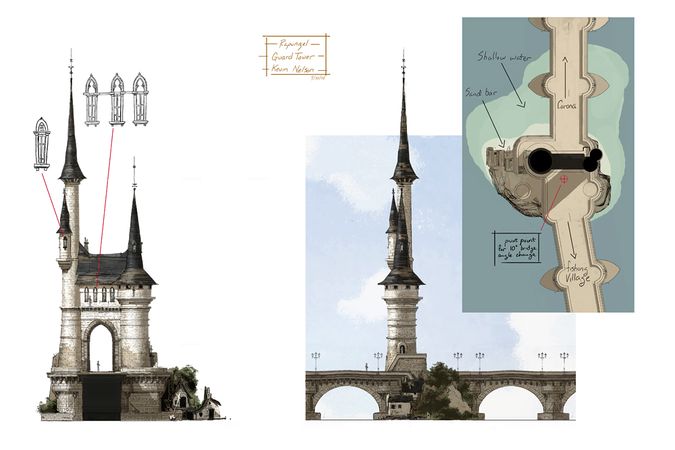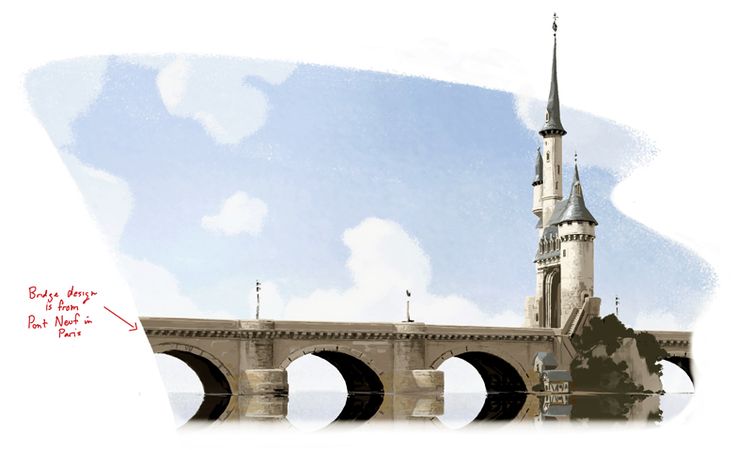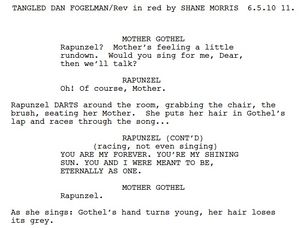Tangled (partially found early drafts of Disney animated film; 2001-2010)
Disney's Tangled was a retelling of the classic fairy tale of Rapunzel. It was the first time that Disney had turned a fairy tale into a CG film instead of traditional 2D animation. Before it was released in November 2010, it had taken a long, turbulent ride through development.
Original Pitch Version
Rapunzel was one of many stories that Disney looked at after the success of Snow White and the Seven Dwarfs in the late 1930s, although it is not known how much work was done on Rapunzel specifically. Legendary animator Glen Keane came up with the idea to turn the story into a Disney animated movie in 1996 while he was working on Tarzan.[1] He developed it for a little while until Tarzan took over his time. Eventually, he pitched the story to Disney CEO Michael Eisner in 2001. Eisner liked it, but stipulated that it had to be CG instead of hand-drawn.[2] Keane was hesitant to do a CG film, being a big proponent of hand-drawn animation, but was intrigued by Eisner's challenge to make CG as fluid and beautiful as traditional animation. So he and the team began working on creating technology to make this happen. Their best-known test was a recreation of the painting "The Swing" by Jean-Honoré Fragonard.
Soon after the pitch, Dreamworks' Shrek was released and was a huge success. In response, Eisner charged Keane with making Rapunzel more like that film, transforming it from a rather dark adaptation of the original fairy tale into a broader comedy. Little is known of the story of the film before this switch. Screenwriter Jon Bernstein has said he was the first writer on the project, though it's unknown when, exactly, he started.[3] Nothing he wrote has ever gotten out to the public, whether it was for this version or the next.
Rapunzel Unbraided
With the switch to a more Shrek-like tone came a new title: Rapunzel Unbraided. At the suggestion of Michael Eisner, the story was changed to incorporate a modern-day component set in San Fransisco.[4] There's a decent amount known about this version because Disney talked it up quite a bit. They were fighting with Pixar at the time and Rapunzel Unbraided was their star title, which would prove that they still had their mojo of the Disney Renaissance era and could compete with Pixar. In 2005, Disney came in force to SIGGRAPH, a computer graphics conference. Glen Keane gave a talk and on the show floor, there were concept art and brief summaries for several upcoming films including Rapunzel Unbraided. This was the synopsis for the movie:[5]
"Sick to death of storybook endings where true love conquers all, our frustrated witch brings two romantically-challenged teens from the real world into the classic fairy tale, and transforms them into the legendary long haired heroine and her gallant prince."
The teens were named Claire and Vincent and were voiced by Reese Witherspoon and Dan Fogler. There were also two small pieces of test footage shown. One was a treatment for the logo, with Rapunzel's hair flowing out the window of her tower. The other was a brief clip of Claire-as-Rapunzel speaking to a squirrel just after she was transported into the fairy tale world.
The squirrel in the test clip is the real Rapunzel. She and the prince were transformed into animals when the teens were brought into their world, with the prince, Beau, becoming a basset hound. Kristin Chenoweth would provide the voice of Rapunzel. Shortly after the final film released, a couple of minutes of pre-viz animation by artist Tony Hudson leaked from this version, including the very beginning of the movie, a scene of the teens driving around in a carriage in the fairytale world, and what appears to be the very end of the film.
Jeanine Tesori was hired to write songs for the film.[6] Kristin Chenoweth recorded one called "What Would I Be Like."[7] Nothing Tesori wrote has ever been released or leaked. Writing partners Sara Parriott and Josann McGibbon were hired to write the film[8]. Nothing they wrote has ever surfaced. This version of the movie was essentially canceled in early 2006 as one of the last acts of the Eisner regime. No scripts from this version have ever been released.
Rapunzel
The cancellation did not last long. Pixar veterans Ed Catmull and John Lasseter were put in charge of all Disney animation after merging with their studio and one of their first decisions was to put Rapunzel back into pre-production. Only this time it would be going back to the darker vision that Glen Keane originally wanted to do. Claire, Vincent, and the modern story in San Fransisco were dropped and the story went back to just Rapunzel, Mother Gothel, and a suitor. This time the suitor was named Bastion. At first, he looked like a gypsy pirate, then he changed into a gentle giant thief who may have been an inspiration for Kristoff in Frozen. The basset hound was kept in some capacity, songs were gone entirely, and Mother Gothel was said to be "a sinister, brooding villain in the tradition of the Queen in Snow White." In 2008 artist Toby Shelton storyboarded a sequence where she is helping Rapunzel wash her hair when Rapunzel starts humming a tune from the outside world that she learned from "the intruder."[9]
The artists were taken with Rembrandt and attempted to give the film a look similar to his paintings, with dramatic lighting and earth-tone colors.[10] The movie continued to have story problems and in spring 2007 Dean Wellins was brought in as co-director.[11] Then in October 2008, Keane suffered a heart attack and had to step back from the production. This marked the end of Keane's version of the movie, as Nathan Greno and Byron Howard were brought in and essentially hit the reset button, turning the movie into a more traditional Disney fairy tale musical. Little is known about the story prior to the switch and no script for it has ever been released/leaked.
Tangled
Greno and Howard brought on Disney legend Alan Menken to write songs and based the visuals of the movie on other Disney fairy tales, mostly Cinderella and Sleeping Beauty. The male lead became Flynn Rider, a charming thief. The title was changed from Rapunzel to Tangled after the soft box office returns of The Princess and the Frog. Disney executives were fearful that boys were put off by titles that felt "girly." The directing pair had already been discussing title changes since Flynn was so important in their version that it felt odd to name it just after Rapunzel.
The story in this version stayed mostly similar up to release. The DVD and Blu-ray release included several deleted scenes and two alternate openings. The filmmakers originally wanted to start with a storybook opening, just like the old Disney movies, but eventually dropped it in favor of the Flynn Rider narration of the final film. These storybook openings had narration from Donna Murphy, who voiced Mother Gothel.
The deleted scenes all came from the middle of the movie, around the Snuggly Duckling sequence. Before the song "I've Got A Dream" was written, there was no musical number in the pub, then called the Jaunty Moose, and instead, the ruffians and thugs recited poetry. After that was a brief cut moment of the ruffians and thugs seeing Rapunzel and Flynn off as they caught a ride in a wagon. They waved to Rapunzel, but gave icy glares to Flynn. Finally, a scene where Flynn and Rapunzel are told their futures by Vigor the Visionary, a monkey fortune teller. Vigor actually makes an appearance in the end credits of the final film.
The original trailer for the film included a bit of Rapunzel's hair, beating up Flynn after he enters the tower. There are several shots in this sequence that are fully lit and animated, but are not in the final film. The way the hair behaves is similar to a part of the Jaunty Moose deleted scene when Rapunzel uses her hair to beat up the thugs and ruffians in a similar manner. It's possible that Rapunzel's hair was set to be more prominent in combat in the early stages of the story.
There was also a cut song written for this version, a lullaby thought to be called "You Are My Forever." The only official mention of it came in an article in the Summer 2009 issue of D23 Magazine.[12]
"[Alan Menken] delivered this lullaby that Rapunzel and Mother Gothel sing to each other that activates the magic in Rapunzel’s hair. The song’s lyrics say ‘You are my forever,’ which – depending on who sings it and when – takes on entirely different meanings. Sometimes it’s a love song between our prince, Flynn, and Rapunzel; other times it’s a terrifying, possessive theme used by Gothel. But it’s great, because it’s a very heartrending, beautiful song, and (Menken) really nailed it."
A couple of lines from the song lasted until the June 5th, 2010 draft of the screenplay, which is available online. Near the beginning of the film, when Rapunzel is about to ask Mother Gothel to see the lights, she very quickly dashes out the Healing Incantation to make Gothel younger. In the June 5th draft, she doesn't sing the Healing Incantation here, but instead, three lines from You Are My Forever.
"You are my forever. You're my shining sun. You and I were meant to be, eternally as one."
The first two lines pop up again when Flynn and Rapunzel are stuck in the cave as water rises. It's unknown how much else there is to the song, or if this is it.
References
- ↑ Glen Keane discusses the origins of Tangled. Retrieved 03 Dec '20
- ↑ Keane's pitch to CEO Michael Eisner. Retrieved 03 Dec '20
- ↑ Jon Bernstein's claim to be the original writer of Rapunzel. Retrieved 03 Dec '20
- ↑ Eisner suggesting modern-day San Fransisco. Retrieved 03 Dec '20
- ↑ Rapunzel Unbraided synopsis from SIGGRAPH 2005. Retrieved 04 Dec '20
- ↑ Jeanine Tesori briefly talking about Rapunzel. Retrieved 04 Dec '20
- ↑ Kristin Chenoweth recorded a song for Rapunzel UnbraidedRetrieved 05 Dec '20
- ↑ Variety report on people being hired for Rapunzel UnbraidedRetrieved 05 Dec '20
- ↑ Storyboards from 2008 by artist Toby Shelton. Retrieved 04 Dec '20
- ↑ Rembrandt influencing Rapunzel. Retrieved 04 Dec '20
- ↑ Dean Wellins made co-director. Retrieved 04 Dec '20
- ↑ Summer 2009 D23 article on Rapunzel. Retrieved 04 Dec '20
